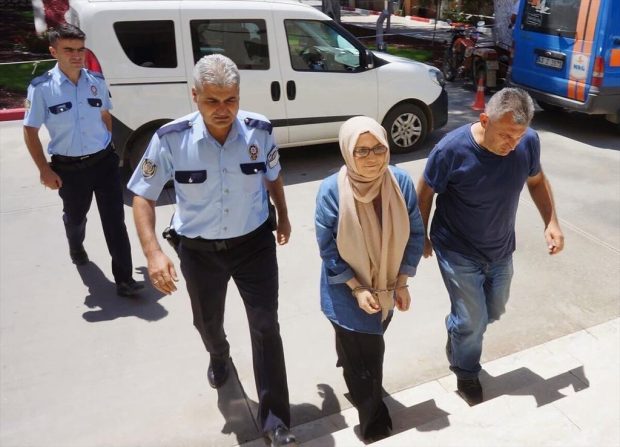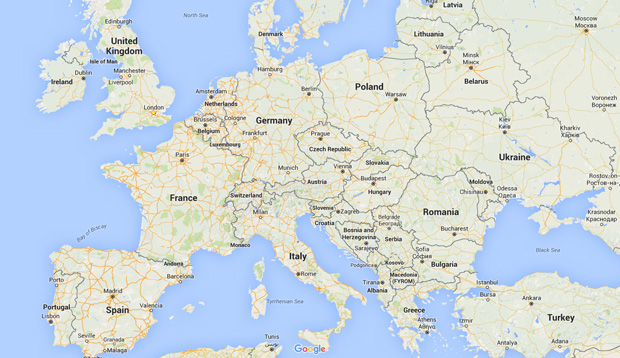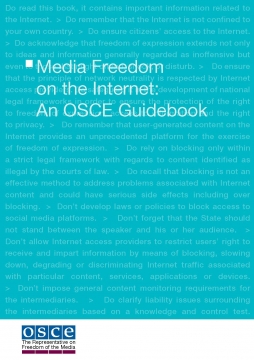8 Sep 2016 | Counter Terrorism, Digital Freedom, Europe and Central Asia, News and features

(Illustration: Shutterstock)
The appalling scene on the strand in Nice on Bastille Day. The dead at the airport and in the Metro in Brussels in March. Terrorist attacks, designed to inflict the highest possible level of fear and apprehension among ordinary citizens, is now ordinary in Europe.
The stakes were raised in earnest in January 2015 with the carnage at the editorial offices of the satirical magazine Charlie Hebdo in Paris, where 10 staffers were brutally murdered by terrorists.
How can such atrocities be avoided or squelched? That is the question.
We know Europeans want something to be done. Living in a perpetual state of fear is not the natural consequence of living in 21st century liberal democracies.
But neither is living in a police state, where personal privacy gives way to the exigencies of war, however unlike this war compares to ones of the past; where mere idle chatter can be misconstrued to the point that it becomes the criminal offense of glorifying terrorism.
Simply put, do our rights to personal privacy and free expression and free association vanish in order to provide a safer physical environment for our residents?
The answer, or answers are not easily arrived at; the debates are nuanced and people of good will and good character can find themselves on opposite sides of issues while both hoping for a similar outcome: peace, security and an open society that respects the inherent rights of individuals to live freely.
Under these difficult circumstances, I think it is important to make the case, once again, to protect individual rights in times of civil turmoil. To do so, I issued a statement earlier this month, as the OSCE Representative on Freedom of the Media setting out the arguments in favour of protection.
First and foremost, the Organization for Security and Co-operation in Europe, the world’s largest regional security body, appears fully on board with the notion of protection of these individual rights. The participating States, in the Astana Declaration of 2010, reiterated the commitment to comprehensive security and related the maintenance of peace to respect for human rights.
And in a Ministerial Council Decisions on Preventing and Countering Violent Radicalization that Lead to Terrorism and on Counter-terrorism that was adopted in 2015, the States confirmed the notion “..that respect for human rights, fundamental freedoms and the rule of law are complementary and mutually reinforcing with effective counter-terrorism measures, and are an essential part of a successful counter-terrorism effort.”
Furthermore, any counter-terrorism measures restricting the right to free expression and free media must be in compliance with international standards, most notably Article 19 of the UN Covenant on Civil and Political Rights and strictly adhere to the principles of legality, necessity and proportionality and implemented in accordance with the rule of law.
Read alone, these pronouncements ought to put an end to any notion that the rights and values inherent in an open society should not survive the fight against terrorism. But it has not. Across the OSCE region, which comprises 57 countries from North America to Mongolia, governments are considering laws that chip away at those fundamental rights.
As a result, I have suggested that lawmakers of OSCE participating States give ample weight and consideration to the following when addressing any legislation that would affect, in law or in practice, the right of people to exercise their human rights:
- Ensure journalists’ freedom and safety at all times, including while reporting on terrorism.
- Recognize that free expression and the use of new technologies are also tools to fight terrorism by creating social cohesion and expressing alternative narratives.
- Clearly and appropriately define, in line with international human rights law, the notions of violent extremism, terrorism, radicalisation and other terms used in legislation, programs and initiatives aimed to prevent and counter terrorism.
- Acknowledge that the media has a right to report on terrorism. Requests for media blackouts of terrorist activities must be avoided and media should be free to consider, based on ethical standards and editorial guidelines, available information to publish in the public interest.
- Fully respect the right of journalists to protect sources and provide a legal framework securing adequate judicial scrutiny before law enforcement and intelligence agencies can access journalists’ material in terror investigations.
- Refrain from indiscriminate mass surveillance because of its chilling effect on free expression and journalism. Targeted surveillance should be used only when strictly necessary, with judicial authorization and independent control mechanisms in place.
- Acknowledge that anonymity and encryption technologies may be the only guarantee for safe and secure communications for journalists and therefore are a prerequisite for the right to exercise freedom of expression. Blanket prohibitions are disproportionate and therefore unacceptable, and encryption regulation introducing “backdoors” and “key escrows” to give law enforcement and intelligence access to “the dark web” should not be adopted.
- Only restrict content that is considered a threat to national security if it can be demonstrated that it is intended to incite imminent violence, likely to incite such violence and there is a direct and immediate connection between the expression and the likelihood of occurrence of such violence.
- Review applicable laws and policies on counter-terrorism and bring them in line with the above principles.
Adherence to these simple rules is necessary because limiting the space for free expression and civic space advances the goals of those promoting, threatening and using terrorism and violence.
If we give up on our fundamental freedoms we will erode the very substance of democracy and the rule of law.
Recent columns by Dunja Mijatović
Dunja Mijatović : Turkey must treat media freedom for what it really is – a test of democracy
Dunja Mijatović: Why quality public service media has not caught on in transition societies
Dunja Mijatović: Chronicling infringements on internet freedom is a necessary task
28 Jul 2016 | mobile, News and features, Turkey

Büşra Erdal, one of 89 journalists subject to arrest, surrendered in Manisa and was taken to police headquarters in handcuffs.
Media freedom must be treated for what it really is: a strong test of democracy. And any response to a crisis requires a cautious approach if basic civil liberties, the building blocks of any free society, are to be protected. Make no mistake about it, in the case of Turkey, we are faced with a situation where authorities are violating the basic human right of Turkish citizens to engage in free media.
Just consider the following media freedom issues that have taken place after the attempted coup in Turkey on 15 July.
- The authorities have ordered the closure of 45 newspapers, 15 magazines, 16 television channels, 23 radio stations, 3 news agencies, and 29 publishers;
- Arrest warrants have been issued against 89 journalists, accusing them of supporting terrorism; seven of them have already been detained;
- 370 journalists at the state broadcaster TRT have been suspended;
- Press accreditations for 34 journalists from eight other Turkish media outlets have been revoked;
- 60 staff members with Cihan News Agency have been fired;
- The Radio and Television Supreme Council of Turkey (RTÜK) has cancelled the licenses of more than 20 radio and television stations;
- The Telecommunications Authority (TIB) has blocked more than 20 news websites.
These issues must also be put in the context of the general, sharply deteriorating media freedom situation in Turkey in the past few years. An anti-terror law in Turkey, in effect since 1991, is being used to round up terrorists but also many others, including those who it is my job to lobby for – journalists and media.
Today there are dozens of journalists in jail in Turkey, prosecuted and convicted mostly under a law designed to fight terrorism and protect people. The number of journalists jailed in Turkey is without precedent in the OSCE region. Under the anti-terror law, merely reporting on controversial topics could land a journalist in court.
The latest case in a string of the recent crackdown activities on media in Turkey is the detention of seven journalists in the last two days, while arrest warrants were issued against several dozens more, accusing them of supporting terrorism. To say that dissenting voices, although still present and persisting, are under duress in Turkey is a severe understatement.
The authorities’ systematic abuse of media and its players, done with the intention of guaranteeing control of the media landscape, is nothing short of a clear and present threat to democracy in the country.
Media-freedom advocates like myself, must and will continue to raise our voices and provide the defenses necessary for free expression and free media to flourish in Turkey.
I will raise the issue of the rights of media and of journalists before national legislatures. I will engage in public awareness campaigns on behalf of free media. I will continue to do everything in my power to protect and safeguard the independent and pluralistic voices that are the cornerstones of any society. And I will call on elected officials to spend the resources, including political capital, essential to build environments conducive to free expression.
I believe that a society that respects human rights is working towards the common good of its people and that limiting and breaching fundamental democratic and civil liberties negatively affects the common good. I also believe that the role of elected officials is to write good laws and appoint good law enforcement authorities, including police, prosecutors and judges to interpret those laws in a manner that will make free expression possible.
All democratically elected governments must adhere to the underlying rules of their society – free markets, universal suffrage, access to government information and other basic civil liberties, including a free and pluralistic media environment.
Freedom of expression is a universal and basic human right; it does not stop at views deemed appropriate by the authorities. It remains the role of journalists to inform people of public issues, including highly sensitive issues. And it remains the role of the authorities to ensure that journalists, no matter how critical or provocative, can do so freely and safely. Turkey fails on this account.
More commentary from Dunja Mijatović
Why quality public service media has not caught on in transition societies
Chronicling infringements on internet freedom is a necessary task
Propaganda is ugly scar on face of modern journalism
More about Turkey
Yavuz Baydar: Erdogan is ruling Turkey by decree
Can Dündar: Turkey is “the biggest prison for journalists in the world”
Turkey’s film festivals face a narrowing space for expression
6 Jun 2016 | Croatia, Europe and Central Asia, European Union, Hungary, News and features

Since the 1920s, generations of western Europeans got used to the monopoly of public radio and later public television. These broadcasters developed strategies to better serve audiences and distance themselves from governments. The arrival of private broadcasters, in many cases taking place only in the 1970’s, was generally viewed as a complimentary service aimed at entertaining the public. Although public service broadcasting lost market share, it remained a respected institution in society; necessary to bring up youth, to get an objective picture of the world and cater to the interests of minorities.
Eastern Europeans also got used to the monopoly of state radio and television. Those broadcasters served the communist parties and were administered and financed by governments. Their political bankruptcy came with the collapse of communist ideology, underlined in particular by the plurality of private broadcasters that came on to the scene in the early 1990s.
These private media – with plentiful Western programming – was indeed television, for so long hidden from the viewers by totalitarian regimes. Politicians flocked to their studios to take part in talk shows, abandoning once-mighty state television. Thus, in the east, the public perception of public broadcasting was predominantly sceptical, if not negative. A discussion on its development was of tangential interest, at least during the saturation process of the new private media.
Abandoned by politicians and the public, the slow and clumsy transformation of the state broadcasters into public ones was guided by the bureaucrats, almost by themselves. The driving force behind the transformation was almost exclusively the activity of Strasbourg and Brussels. We all know that in the words of European institutions “public service broadcasting is a vital element of democracy in Europe.” Transformation of state television into a public one was a condition precedent of new democracies becoming member states of the Council of Europe in some cases. The authenticity of the transformation has been important to become a candidate for entry into the European Union and even sometimes to NATO.
Developments in younger EU member states show the importance of public service broadcasters for the development of democracy – and how they can be misused.
In December 2015, Poland‘s parliament adopted a law giving the treasury minister the mandate to appoint and dismiss members of management and supervisory boards. Since the law came into effect in January, reportedly more than 100 journalists in public media have lost their jobs, allegedly for not being government-friendly.
In March, the Croatian parliament dismissed the director general of Croatian Radio-Television. A week later, the government also proposed that parliament reject a regular report from the independent media regulator, both events raising serious concerns about the overall media freedom situation in the country.
Hungary was probably the first example in the EU where public service broadcasting was practically turned back into state broadcasting, going against international standards calling for independence. New media laws in 2010 and the restructuring of the media landscape led, within a matter of one year, to all public service media being subordinated to political decisions. The new system introduced and cemented the political dependence of public service media; the governing party had nominated all new heads of public service media and the Media Authority now controls the budget of all public service media. The law vested unusually broad powers in the politically homogeneous Media Authority and Media Council, enabling them to control content of all media.
The battle to establish credible public service broadcasters in transitional democracies has been even more difficult to wage.
The latest example is the steering board of Bosnian Radio and Television which last month decided to suspend operation of all programming at the end of this month. This decision, a wrong one for several reasons, follows years of political and financial wrangling over control of the operation.
Throughout the western Balkans, significant issues are pending affecting the independence and financial stability of public broadcasting.
A bureaucratic response to the need to establish public service broadcasters has brought predictable results. The newly established broadcasters were visibly underfunded, with formal and informal administrative links – if not strings – to governments and no clear commitments to the public. Once established, it was unclear what to do with them. Most governments viewed them as an element of bureaucracy itself, a burden to carry on the road to a united Europe. If possible and convenient, they tried to make use of them through a carrot-and-stick policy.
As such, the new public service broadcasters immediately became subject to criticism by almost anyone who wanted to speak about them. Left to survive in the monstrous buildings of brutal architecture that once belonged to powerful state television, they had to sell airtime to advertisers, beg for Western donations and save on everything.
The advance of the internet and other new technologies almost killed the whole idea of television and radio, including public service broadcasting. It was saved by the transformation process – from public service broadcasting to public service media. In the West, the BBC and other companies have struggled to make use of the changing trends in media consumption. They went online, launched smartphone applications, became interactive, archived in order to engage fragmented audiences where and when required by the viewers.
Unfortunately this is not the case in the East. Public service broadcasters at best try to appeal to the older and well-educated audiences, traditional in their use of public service media. For our children, today’s debate is not only irrelevant, it is beyond their understanding.
Is there a future?
In my view we are losing the battle and might soon lose the war. To reverse the trend, we should do the following:
Give public service broadcasters a clear-cut mandate and obligation to program for the public which, in turn, should have effective feedback and control over content. There should be programmes that cater to minorities; there should be objective news, calm and matter-of-fact debates, educational and children’s programmes.
Public service broadcasters should function independently of the government. Buffer boards, meaning councils should be established to guarantee that only an abuse of a clear-cut mandate may serve to reprimand or dismiss an editor; only mismanagement and corruption may lead to firing executive directors.
And, finally, licence fees should be introduced or increased to heighten a feeling of public ownership. We can talk about other methods of independent funding, but none of them may bring this feeling of owning an institution that serves you.
Recent columns:
Dunja Mijatović: Chronicling infringements on internet freedom is a necessary task
Dunja Mijatović: Propaganda is ugly scar on face of modern journalism
Dunja Mijatović: There is hope that justice can be served in Serbia
21 Apr 2016 | Digital Freedom, mobile, News and features
 As the OSCE Representative on Freedom of Media, I believe that the rights afforded to producers and consumers of traditional media equally apply to new media platforms as well.
As the OSCE Representative on Freedom of Media, I believe that the rights afforded to producers and consumers of traditional media equally apply to new media platforms as well.
That is why my office, an independent institution that is part of the Organization for Security and Co-operation in Europe, will continue to monitor developments across the 57-state region of the international organisation to alert governments to the dangers of unnecessary and excessive regulation of this great, new electronic frontier.
As part of these monitoring activities, my office recently published Media freedom on the Internet – an OSCE guidebook, written by Law Professor Yaman Akdeniz of Istanbul Bilgi University. Akdeniz, one of three winners of the 2016 Columbia University Global Freedom of Expression Prize in the legal service category, was also the author of the online publication Freedom of Expression on the Internet, a study of legal provisions and practices related to freedom of expression, the free flow of information and media pluralism on the internet in the OSCE participating States.
His latest publication provides a concise overview and update of these issues. It also reviews OSCE media freedom commitments, Article 19 of the Universal Declaration of Human Rights, Article 19 of the International Covenant on Civil and Political Rights, Article 10 of the European Convention on Human Rights and case law of the European Court of Human Rights.
Too many OSCE participating states block, filter and shut down websites and social media platforms. These restrictive measures, of varying magnitude, have the overarching goal of suppressing free expression online.
To me, the human rights framework strengthening free expression on the internet is clear. Article 19 of the Universal Declaration of Human Rights says:
“Everyone has the right to freedom of opinion and expression; this right includes freedom to hold opinions without interference and to seek, receive and impart information and ideas through any media and regardless of frontiers.”
Indeed, this declaration, adopted in 1948, has withstood the test of time, providing a framework for the protection of expression on the internet, as well as print media or free speech.
And in 2012, with the adoption of the landmark Resolution 20/8, the “promotion, protection and enjoyment of human rights on the Internet,” the UN Human Rights Council confirmed that Article 19 of the Universal Declaration of Human Rights applies online in exactly the same way as it does to traditional media and speech.
So what’s the issue?
Governmental authorities, politicians, law enforcement officials and, yes, free expression campaigners still tend to frame the issue of internet regulation as a debate without modification, pitting one essential value against another. In the case as it is postulated today that means trading off civil rights for national security. And vice versa.
Confusing the situation further are the calls from those who claim that governments and their regulatory authorities have absolutely no right to interfere with the transmission of ideas across new media platforms.
Governments do have a crucial role to play when it comes to regulating the internet and guaranteeing its freedom. This responsibility extends to the protection of minors from harmful content, combating racism and inhibiting content inciting hatred or violence and even fighting cyber crime. Conduct that constitutes a crime in the real world does not deserve even a patina of protection simply because new technologies are employed in its development and transmission.
But governments must also ensure that all stakeholders, including civil society, are consulted and involved in these efforts ensure that regulations designed to ensure the safety of the internet also prioritise and safeguard free expression. To put it simply, the less regulation the better. And regulations need to result in limited disruption to the creation and distribution of ideas and opinions and only for clearly defined and defensible reasons.
Professor Akdeniz’s new treatise provides a list of helpful do’s and don’ts for policymakers engaged in legislative drafting and regulatory enforcement. They would be wise to pay heed to the recommendations.
The publication is available online at www.osce.org/fom/226526.




 As the OSCE Representative on Freedom of Media, I believe that the rights afforded to producers and consumers of traditional media equally apply to new media platforms as well.
As the OSCE Representative on Freedom of Media, I believe that the rights afforded to producers and consumers of traditional media equally apply to new media platforms as well.